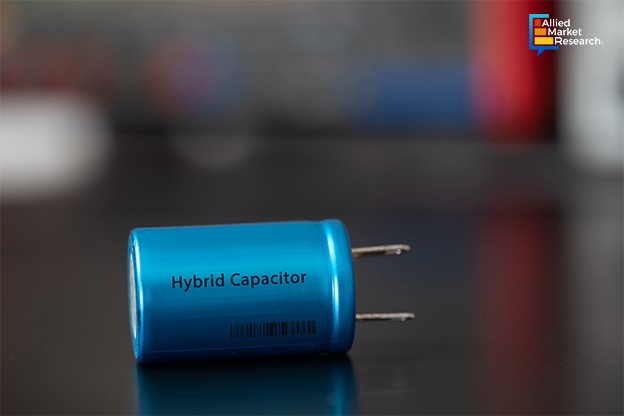Analyzing the Reasons Behind the Increased Investments by Electronic Companies in Hybrid Capacitors

30 May
2024
Key Takeaways:
- Introduction
- Contribution of hybrid capacitors in the EV sector
- The growth of the landscape in Asia-Pacific
As the name suggests, hybrid capacitors are manufactured based on the best features of polymer and aluminum capacitors. These capacitors, also popularly known as supercapacitors or hybrid supercapacitors, have a higher operating voltage (3.8V), capacitance, and energy density up to 10 times compared to conventional supercapacitors. Apart from this, they offer better stability over temperature, better power density, and improved electrical performance due to their composition.
Utilizing hybrid capacitors in improving the capabilities of EV technology
The EV revolution has completely changed the landscape of mobility and led to the development of technologies that were previously unheard of. For instance, the concept of autonomous vehicles is an extension of electric vehicles as the semiconductor technologies used in EVs give a platform for automobile engineers to design further and develop cars that could make driving decisions on their own. Hence, semiconductors and other electronic components like hybrid capacitors in electric vehicles have become quite important for the EV sector.
Hybrid supercapacitors have helped EV manufacturers to increase the performance of their cars. Hybrid supercapacitors act as powerful energy storage systems that have the capacity to offer high currents as compared to what traditional capacitors and batteries provide. This ultimately results in the betterment of several parameters like quick acceleration, regenerative braking, and superior maneuverability.
Another aspect of the high power density and energy storage features of hybrid supercapacitors is that they improve the range of electric vehicles. The basic reason behind this outcome is that, when combined with lithium-ion batteries, these supercapacitors can manage, control, and regulate the energy that is being delivered to different components of the vehicle in a much better way.
Understanding the growing popularity of electrical vehicles, many semiconductor manufacturing companies have started to develop different types of hybrid capacitors to cater to the demands of the automobile sector. For instance, in March 2024, Panasonic, a major electronics company announced the launch of the ZL Series hybrid supercapacitors that can operate at 125°C and 135°C at 4,000h. The company released a statement saying that the new series of supercapacitors are developed with the aim to assist engineers develop advanced driver-assistance systems (ADAS), high current DC-to-DC converters, high-end oil pumps, etc. Such product launches ultimately help in the expansion of the industry and also aid the company in increasing its customer base across the globe.
The growing dominance of the Asia-Pacific region in the industry
The growing use of the radial-type hybrid capacitor is expected to increase the revenue share of the hybrid capacitor industry significantly across the globe, especially in the Asia-Pacific region. Secondly, the EV sector has grown massively across the province, particularly in the countries where governments have enacted legislation to limit the use of fossil-fuel-based vehicles. Many countries have also made efforts to introduce electric buses and other public transportation measures to reduce carbon emissions.
Due to these reasons, the demand for hybrid supercapacitors has increased widely in Asia-Pacific. The rising demand for advanced consumer electronic devices has also played a major role in the growth of the landscape in the region, especially India. The India hybrid capacitor sector is projected to rise at a CAGR of 7.2% in the 2023-2032 period owing to these factors. Along with this, the rising awareness regarding renewable energy has led to increasing demand for these renewable energy storage systems. These storage systems employ hybrid supercapacitors for their efficient functioning which is estimated to create favorable conditions for the landscape in the near future. Moreover, the technological advancements and product launches by multinational companies like Panasonic are predicted to offer numerous opportunities to the sector in the next few years.
To summarize, the hybrid capacitor industry is projected to experience huge growth in the 2023-2032 period owing to the increasing popularity and applicability of hybrid supercapacitors in the EV sector. Furthermore, their increased usage in renewable energy storage systems is expected to help the market improve its footprint across the globe.
For tips and suggestions on how businesses can increase their revenue share in the industry, feel free to contact us.

Akhilesh Prabhugaonkar
Author's Bio- Akhilesh Prabhugaonkar holds a bachelor’s degree in Electronics Engineering from the reputed Vishwakarma Institute of Technology. He has a special interest in the fields of forensics, world history, international relations and foreign policy, sports, agriculture, astronomy, security, and oceanography. An ardent bibliophile and melophile, Akhilesh loves to write on topics of his interest and various other societal issues. This love for writing made him enter the professional world of content writing and pursue his career in this direction.
Avenue: Entire Library membership of Allied Market Research Reports at your disposal
- Avenue is an innovative subscription-based online report database.
- Avail an online access to the entire library of syndicated reports on more than 2,000 niche industries and company profiles on more than 12,000 firms across 11 domains.
- A cost-effective model tailored for entrepreneurs, investors, and students & researchers at universities.
- Request customizations, suggest new reports, and avail analyst support as per your requirements.
- Get an access to the library of reports at any time from any device and anywhere.
Related Post
-
How are Submarine Cables Transforming Global Connectivity with Enhanced User Experience?
-
Endoscopy Procedures: Transformations in Techniques and Applications
-
AI-Powered Video Analytics: How the Product Actually Works for enterprises
-
Painting Robots: Transforming Precision Coating and Creative Applications
-
Innovations in Pharmacovigilance Systems Advancing Patient Safety
-
Understanding Edge Security: Keeping Data Safe Near the Source
-
Exploring the Use and Advancements of 3D Laser Scanners in Professional Applications
-
Reinforcing Industrial Controls with Smarter Tools and Training








